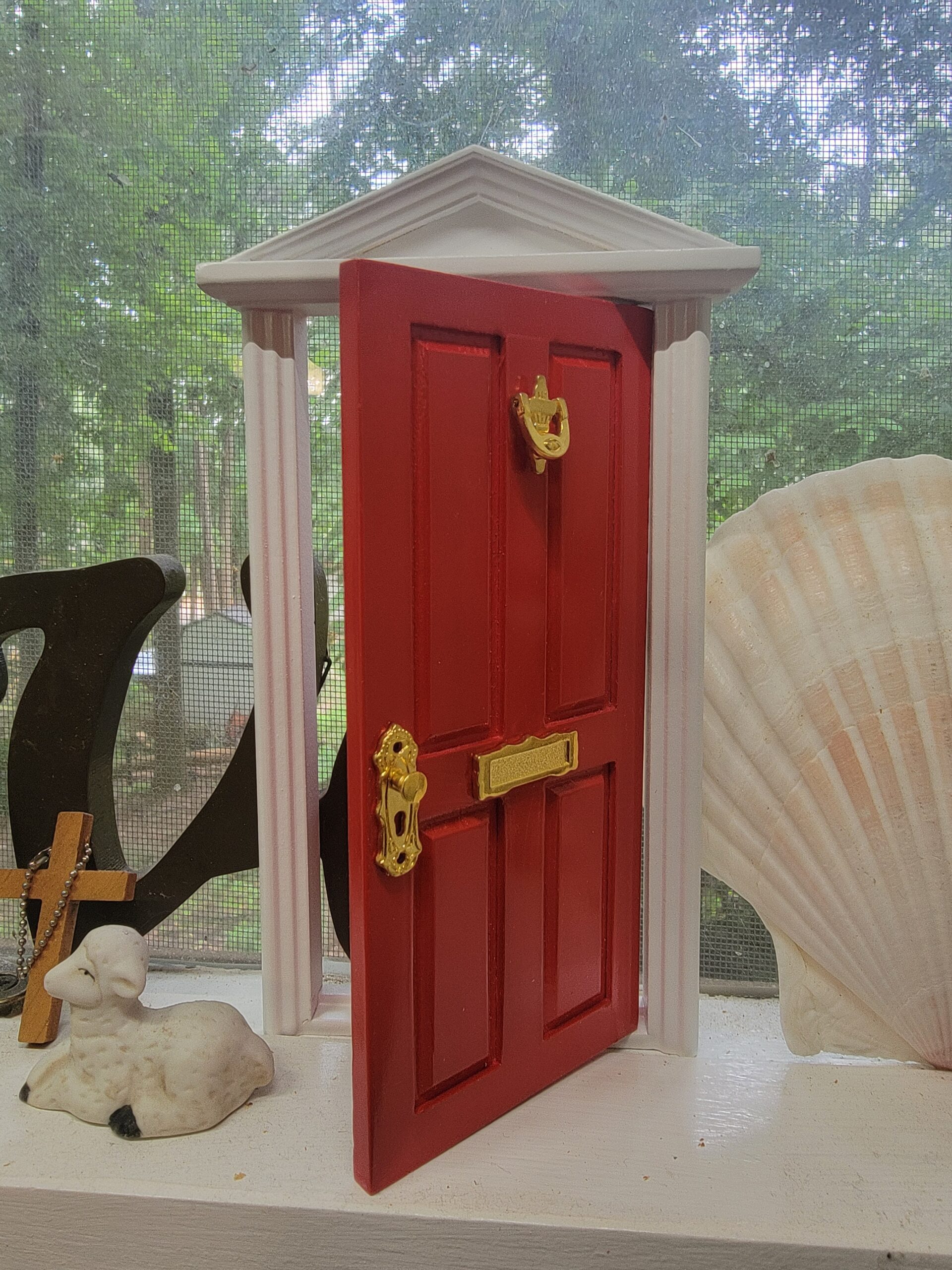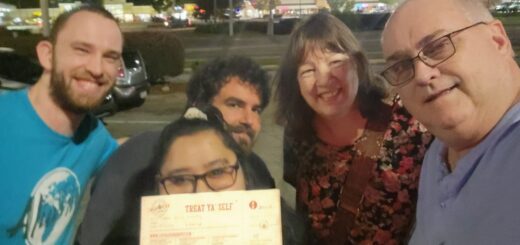Green Rags and Red Doors

“Green Rags and Red Doors” – June 2nd, 2024 (Mark 9)
Mark 9:30-37 (NRSV) – “30 They went on from there and passed through Galilee. He did not want anyone to know it; 31 for he was teaching his disciples, saying to them, ‘The Son of Man is to be betrayed into human hands, and they will kill him, and three days after being killed, he will rise again.’ 32 But they did not understand what he was saying and were afraid to ask him. 33 Then they came to Capernaum; and when he was in the house he asked them, ‘What were you arguing about on the way?’ 34 But they were silent, for on the way they had argued with one another who was the greatest. 35 He sat down, called the twelve, and said to them, ‘Whoever wants to be first must be last of all and servant of all.’ 36 Then he took a little child and put it among them; and taking it in his arms, he said to them, 37 ‘Whoever welcomes one such child in my name welcomes me, and whoever welcomes me welcomes not me but the one who sent me.’”
In the gospel of Mark, we are told that the disciples did not understand in Mark 4, Mark 6, Mark 7, twice in Mark 8, and now in Mark 9 we are reminded of that yet again! We almost feel sorry for them, as they tried so hard to comprehend what Jesus was saying and doing, but as Mark keeps reminding us, they just. don’t. get. it. We remember that the first couple of chapters of Mark are chock full of parables. The disciples didn’t understand Jesus’ parables at first, but gradually they began to get an inkling about Jesus’ hidden messages. They were catching on that Jesus sometimes spoke in a kind of code because it wasn’t yet the right time to say these things plainly. It reminds me of a really difficult physics class where the teacher has taught the class a complicated mathematical formula and then provided lots of problems so you can practice honing your skills at applying this formula. But in the middle of those practice problems, in what seems like a very unkind thing to do, the teacher inserts a completely different kind of problem that you don’t even recognize because you’re practicing applying your newly learned skills.
I wonder if this is how the disciples felt when in Mark chapter 9, Jesus says something very straightforward with no hidden message at all. We feel a bit sorry for them because we’ve read the whole book, we’ve seen the movie, we’ve heard how things turned out in the end. But they’re in the story, living out this narrative. They’ve been having trouble understanding from the start. Understandably, they automatically assume that Jesus is giving them another hidden message. Jesus tells them, “The Son of Man is to be betrayed into human hands, and they will kill him, and three days after being killed, he will rise again.” From where we stand, we realize that Jesus is speaking quite literally. But Jesus uses two phrases that might have confused them because they sounded like some sort of code.
The first phrase, “Son of Man,” crops up dozens of times in all four gospel accounts. We can tell that Mark wants us to realize that Jesus is talking about himself. This phrase, “Son of Man,” would have been familiar to those who studied the scriptures, but the disciples were largely ordinary people who did not have access to either scriptures or education, as we do today. As an aside, keep in mind that the phrase “the twelve” is used throughout the gospels to refer to the first twelve apostles, and the word “disciples” refers to the larger group of men and women who followed Jesus. Back to the phrase “son of man” – where does this phrase come from? “Son of Man” appears in many, but not all, translations of Daniel 7:13-14, including the ESV – “13 I saw in the night visions, and behold, with the clouds of heaven there came one like a son of man, and he came to the Ancient of Days and was presented before him. 14 And to him was given dominion and glory and a kingdom, that all peoples, nations, and languages should serve him; his dominion is an everlasting dominion, which shall not pass away, and his kingdom one that shall not be destroyed.” This is language of the coming kingdom of God, of the Messiah.
The other phrase that the disciples might have thought was a coded message was “three days after being killed, he will rise again.” Earlier in Mark 9, after Jesus’ transfiguration, we read in verses 9 and 10 that “as they were coming down the mountain, he ordered them to tell no one about what they had seen, until after the Son of Man had risen from the dead. 10 So they kept the matter to themselves, questioning what this rising from the dead could mean.” Most Jews at that time believed in the resurrection at the end of the age. But they had no expectation that anyone would be resurrected during the present age, on earth. This idea would have seemed confusing.
Jesus can see that things have passed the point of no return, and the rapids are not far off, to continue last week’s white water rafting analogy. The time has come for Jesus to let the disciples know what is about to transpire because they are not expecting it, and it is going to be very difficult. Jesus wants them to be prepared. Jesus doesn’t say the same things in public and in private. He is explaining this to the disciples. The crowd won’t see what’s happening until it unfolds.
“The Son of Man is to be betrayed into human hands, and they will kill him, and three days after being killed, he will rise again.”
You know what it’s like when someone says something shocking. It’s hard to hear the whole thing clearly the first time. Maybe all they could hear were the words “betrayed” and “killed”. A few of them might have also noticed the words “rise again.” What did it all mean? When someone says something shocking to us, the words are honestly hard to hear properly. If we smile at Mark’s description, “they did not understand what he was saying and were afraid to ask him,” it’s probably because we have also played those games of pretend before. “If we ignore it, maybe it will just go away.” “If it seems like a mystery, maybe it isn’t real.” “If we don’t repeat the prediction, maybe it won’t happen.” You know, ignorance is bliss! But is it? As hard as they tried to sidestep what Jesus had said, it must surely have been echoing inside their minds, eating them up inside.
The next thing we’re told is that they were arguing with each other while walking to their next destination. They’d barely entered the house and hadn’t even sat down yet when Jesus asks them directly what they’d been arguing about. They were so ashamed about what they’d been arguing about that they did not even answer Jesus. Silence. The gospel writer of Mark, who must surely have had many conversations much later about every detail of Jesus’ life and ministry, fills us in. The disciples had been arguing about who was the greatest. From where we stand, this is hugely ironic, because they were in the presence of the greatest person in the entire universe! The disciples did not understand what Jesus being Messiah meant. The disciples did not understand about the kingdom of God that Jesus kept mentioning. The disciples did not understand the price that Jesus would pay in order to enact God’s plan to rescue, renew, and transform all of humanity and all of creation. The disciples did not understand that Jesus would suffer humiliation, betrayal, suffering, abandonment, and apparent defeat in death. The disciples did not understand Jesus’ mission, and they did not understand their calling. Not yet, anyway! Not only did they not understand these things; they were actually going in the opposite direction.
Green Rags
So, Jesus patiently sits down and teaches them a lesson that they would never forget, another show-and-tell object lesson. The kingdom of God is sometimes nicknamed “the upside-down kingdom.” The first thing Jesus says is, “Whoever wants to be first must be last of all and servant of all.”
The word “servant” carries quite a lot of baggage in our culture today. It doesn’t help that some translations of Mark 9:35 use the word “slave.” The original Greek word, diakonos, means servant, minister, any one who performs any service. I brought some cleaning rags today as a visual aid to help us to remember the first of our two main points. These rags can be used for cleaning most household surfaces, washing windows, mopping up messes, and even dusting (shhhh, don’t tell my rags that – it’s my least favorite chore). I think because I’ve been thinking a lot about shalom, maybe more this past year than ever before, I chose green rags. Green speaks to me of the shalom of the kingdom of God because green symbolizes wholeness, flourishing, and delight. When I sit on my front porch, my view is saturated with every shade of green, as we are blessed with an abundance of trees, shrubs, and other plants. All this to say, green rags today symbolize serving others. There are many ways to serve others, but serving often involves cleaning stuff up, whether we’ve prepared some food to enjoy with others, scrubbing toilets, or cleaning up roadside trash.
As with all Scripture, we need to look at the socio-historical context. What was going on in the Ancient Near East that could help us to better understand what Jesus was saying? It’s very important to realize that their culture was an honor-shame culture. Honor was the positive status that one had in the eyes of those whom one considered to be significant. Shame was a negative status and implied disgrace and unworthiness. Status and honor were everything! When Jesus called each of his disciples, “Follow me,” it meant a rise in status, honor, power, and prestige for each of them, because Jesus was a Rabbi. It was an honor to be accepted by a Rabbi. Jesus had become very popular and powerful, which is why the religious and political leaders felt threatened by him and wanted to get rid of him. So, the disciples did what came naturally in their culture, figuring out their status in relation to each other.
It’s not as though the disciples had no understanding at all. They had partial, incomplete understanding. By this point, they were well on their way to understanding that Jesus was the Messiah. But their partial, incomplete understanding lead them to some false conclusions.
The disciples falsely concluded that since Jesus was the king, then as his chosen followers, then they would surely be nobles in the king’s court who would be given honor and status and influence. We can have compassion on the disciples for this misunderstanding, for it was the only paradigm they knew! In their honor-shame society, competition for honor dominated every situation. The disciples mistakenly concluded that because of their association with Jesus, they would be great, you know, the ones in charge. And one of them would be the greatest of the great. Serving others wasn’t something anyone was aiming for. Serving others included ordinary things like waiting on tables, taking care of children, doing household chores. There were two groups of people who did the serving in that culture. In wealthy households, male or female slaves did these tasks. But for the majority of people, there were no slaves or servants in the home – these tasks were done by women and girls.
Jesus turns these things completely upside down. He calls his disciples to turn away from contests for power, domination, bullying, and control. He calls them to instead take the lowest place, not to be served but to serve. The kingdom of God is a place of serving in which they can choose to will the good of others. Where is the Holy Spirit inviting us to serve others with our green rags?
Red Doors
During the Middle Ages, a tradition arose in English churches such that doors on at least the front, and sometimes on all four sides, were painted red. If you were being pursued by someone, you could enter a church’s red door and find sanctuary. Anyone claiming sanctuary like this could state their case to the priest and ask for justice to be served. Pursuers did not dare to enter the church, not willing to commit violence on holy ground. Tamera and I recently did a simple and unplanned tour of an Episcopal church. Our host drew our attention to the red door, indicating that it meant that everyone is welcome. Red doors are an invitation to all to enter a space filled with the Holy Spirit. Red doors gleam like fire and welcome all who walk through them.
Jesus has just told his disciples, “Whoever wants to be first must be last of all and servant of all.” What Jesus did next was so surprising and radical that nobody would have seen it coming. Jesus took a little child and put it among them. And then, in a very tangible demonstration, Jesus took the child in his arms. As he did so, Jesus stunned them by saying, “Whoever welcomes one such child in my name welcomes me, and whoever welcomes me welcomes not me but the one who sent me.”
To take a child in your arms is to welcome the child. To take a child in your arms is to embrace the child. It sounds simple enough. But I’d like for us to slow down here and examine closely what happens when we embrace someone. Theologian Miroslav Volf describes the anatomy of embrace as containing four structural elements: opening the arms, waiting, closing the arms, and reopening the arms. In the first stage of embrace, Jesus, by opening his arms, indicated that he had created space for the child to come in, and that he had also moved, so as to enter the space created by the child. When one person desires to embrace another, the embrace only takes place if the other person reciprocates that desire. An embrace is not an embrace if one person inflicts it with violence on the other. In the second stage of embrace, Jesus waited for the child to indicate that they wanted to be embraced. It takes two pairs of arms for one embrace to occur. In the third stage of embrace, Jesus gently closed his arms around the child. This was an act of free and mutual giving and receiving. In the fourth and final stage of embrace, Jesus reopened his arms to let the child go. An embrace that lasts longer than both persons desire is an act of violence inflicted by one person on the other. This might sound so technical and nitpicky. But remember, Jesus chose a little child to tangibly demonstrate something very important to his disciples. He wanted them to understand what it looks like to welcome the other. In fact, he wanted them to understand what it looks like to welcome all others.
It’s hard for us to relate to societal attitudes towards children in the ancient Near East, because as followers of Christ, we hold children in very high esteem as fellow bearers of God’s image. In the culture in which they lived, Jesus was very intentional in choosing a little child as the exemplar of the last and the least. All over the ancient Near East, age and tradition were held in the highest esteem. Children represented the bottom of the socio-economic scale. They lacked status; they had no rights; they were powerless; they were far more dependent on their parents than children in our society today. The mortality rate was very high: 25-30% of children died in their first year of life, and only 50% of children reached the age of 10. Because of that, children were not even seriously considered members of their own family groups until they reached young adulthood. Children were not asked, “what do you want to be when you grow up?” Children were trained to be subordinate to and dependent on parents and for a productive future role, primarily to maintain household and societal hierarchies.
Jesus’ radical and stunning lesson for his disciples upset their expectations in two specific ways. Firstly, the disciples had expected that as Jesus’ followers, they would be the gatekeepers of Jesus’ power, influence, healing, favor, and acceptance. We are told of several occasions when Jesus’ followers tried to draw lines between who was in and who was out, lines that Jesus kept erasing. Let’s be careful not to take Jesus’ correction of the disciples’ seeking for honor and status too far the other way, though. In no way is Jesus saying that his disciples were worthless. There’s no worm theology here. Jesus is saying that it is not only those who are already following him who have direct access to God. The way has opened up for all (“whoever welcomes me welcomes not me but the one who sent me”).
The second way in which Jesus’ lesson upset his disciples expectations had to do with who they were to welcome. By welcoming a little child, Jesus gave his disciples an expanded vision for who they were to welcome in God’s kingdom. In their culture, welcoming was reserved for important guests only. The idea of welcoming all would have been unheard of and startling. Why would we welcome them? In the ancient Near East, people were pretty much locked into roles determined by birth. This affected every social situation, with most groups seating people according to social rank. One extreme example of this was the Qumran sect. They did an annual reevaluation of each member’s rank, which determined the order of where they sat and the order of when they spoke for the coming year.
Jesus welcomed a little child, representing the very last and least in society. The disciples needed to realize that Jesus’ expanded vision was that they were to welcome the least, the weakest, the last, the forgotten, the marginalized, the poor, the vulnerable, the exploited, the sick, the broken, the ungreat. This is radically good news! Jesus wanted the disciples to see that the kingdom of God is a place of welcoming in which they could choose to invite, welcome, and embrace all, no exception. Where is the Holy Spirit inviting us to paint some doors red, to show and tell others, “You are welcome here! Everyone is welcome here!”
The kingdom of God is a place of serving and welcoming
Did the disciples discover the answer to their original question as to who is the greatest? Jesus both showed and told them that in the upside-down kingdom of God, the one who wants to be first must be the one who serves and welcomes ALL those who are the very last and very least. Jesus taught them in an unforgettable way that whoever welcomes the last and the least in Jesus’ name welcomes God. Jesus knew how important it was that his disciples gained a much clearer understanding of both Jesus’ mission and their calling before they reached the rapids ahead.
We’ve seen how the disciples had partial, incomplete understanding. What about us? Are we prepared to let go of our partial, incomplete understanding so that we can understand better what God is asking of us today?
Where could we use our green rags? How is God calling us to serve? There are innumerable ways in which we can serve. Here are three upcoming opportunities to serve with others at Liberty Vineyard:
- Pick up trash, beautify our community, and enjoy the camaraderie of picking up trash at our quarterly Adopt-a-Road this Friday, June 7th @ 3:00pm.
- Sing some songs, get to know residents, and spend time together at our monthly Music and Ministry at Meadowbrook on Saturday, June 15th @ 2:00pm.
- Donate and pack supplies, pray blessings, and pen encouragements at Goodies for Gardeners on Sunday, June 16th @ 10:00am.
Come talk to me or visit our website for more details on any of these.
Which doors need to be painted red? How is God calling us to welcome? There are countless ways in which we can welcome others. Here is a new initiative we’re launching this month. God put this on my heart six months ago, and as I’ve kept wondering if this is a God idea or a weird Karen idea, I’ve realized it might actually be both. God uses us just as we are, in all of our personalities and weirdness, yes? I’m calling it “Pasta in the House.” I’m looking for willing hosts to partner with me for a small gathering in your home or workplace or local park to have some pasta with the pastor and some intentional spiritual conversations – Pasta in the House (get it?). Together you and I will select a type of pasta, a location, and a date. I’ll provide a pasta dish, you’ll invite 2 or 3 people who are unchurched or de-churched and one person from Liberty Vineyard to help you host behind the scenes. I’ll prepare some short conversation starters that utilize both our themed pasta and some deep truths. We’ll have a great time of food, fellowship, and fun together! We’ll figure out the rest as we go along. Let me know if you’d like to talk about hosting Pasta in the House!
Let’s pray. God, we ask you for the grace and grit we need in order to serve others with our green rags and welcome others by painting red doors, in the name of Christ Jesus and for your glory. Come, Holy Spirit!






